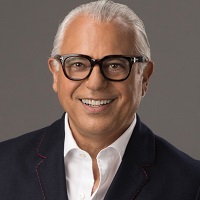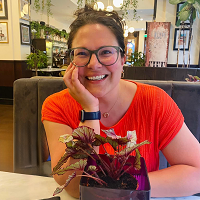
MyEDC gets you the answers you need
Join more than 30,000 Canadians who rely on MyEDC to grow their businesses with confidence.
Aug. 23, 2023

Welcome to Export Development Canada’s (EDC) new podcast, the Export Impact Podcast! In our first episode, we’ll introduce you to the host of our show, Joe Mimran. A Canadian fashion designer and entrepreneur, Joe is known for his international brands, Club Monaco and Joe Fresh. In this haute couture episode, Joe shares his story on how he got involved in the fashion industry and why he created his own brand, while sharing tips for success.
Where to listen
Follow us on your favourite streaming platforms to never miss an episode of the Export Impact Podcast. Tune in to our podcast for new episodes every second Wednesday at 6 a.m. EDT.
Chantal Capistran 0:01
Hello and welcome to the Export Impact Podcast: Export Development Canada’s new podcast. I would like to begin today’s episode by acknowledging that we’re broadcasting to you from my home office in Montreal, which is on the traditional unceded territory of the Kanien'kehá:ka Nation. We value taking this moment to deepen the appreciation of our Indigenous communities wherever we are, and to remind ourselves of our shared debt to Canada’s First Peoples.
My name is (Chantal Capistran) and I’m the vice-president of Corporate Communication here at EDC, and I will be your host for today’s episode. Let me just say, we have some very exciting episodes for you in 2023. But first, let me introduce you to the official host of the Export Impact Podcast, Joseph Mimran. Joseph is a Canadian fashion designer and hugely successful entrepreneur known for building the world-renowned brands: Alfred Sung, Club Monaco, Joe Fresh, and he’s co-founder of Pink Tartan. He’s also a former Dragon on (CBC’s) Dragon’s Den.
Joseph will be sitting down every two weeks to talk with trade experts in Canadian businesses about what it takes to go global. From backyard startups to global trailblazers, he’ll introduce you to people who are taking risks, dreaming big, and making a global impact. Joseph, thank you for being here today and for agreeing to host our new podcast. We’re so excited to be able to glean from your experience. All right let’s get started. Joseph, please tell us about how you got into this amazing world of fashion and design.
Joe Mimran 1:46
By all means, it’s a long history and it starts back in the late ’70s. I actually graduated as a CPA (chartered professional accountant) and have a finance accounting background. I took my undergraduate in general arts. I always had a love for the arts. Fine art was one of the subjects I took through university, and I also had an art gallery when I was very young at the age of 20. I had a love for art so much that I opened an art gallery in Toronto. And so, I’ve always had both sides of my brain working. I loved fashion from a very early age. It was very influenced by the music scene in the ’60s and ’70s and that shaped me quite a bit. My mother was a fashion designer, so I grew up with textiles always in the house and sewing machines in the background. One day, my brother called me and said he was going to go and take a job with an apparel company. I said, “Well, why don’t you start your own company?” And he did that while I was finalizing my degree. Seven months later, I joined him in a business which was selling dresses—that my mother had designed. And we just started with six sewing machines—very, very humble beginnings—and realized very early on that brand—and branding—and designers —famous designers— really were controlling the market. Retailers and brands controlled the market at that time. And so, we were going to go and find some brands that we were going to import, which is what most Canadians did. Most Canadians didn’t think of creating their own brands. And so, we met with Oscar de la Renta and said, “Look, we want your brand for Canada. We make beautiful dresses.” He and his business partner had interviewed us, and they said, “Fine, let’s go ahead. Let’s move forward.” And then, we thought about it and being very young and naive, we thought, “Why should we import a brand? Why should we pay a license fee? Why don’t we create our own brand?” And that is the beauty of being a naive and young aspiring entrepreneur because it’s very difficult to build your own brand in Canada.
So, the first thing we did was we went and hired a designer. We hired a designer because we had already bought all the fabrics and we knew what we wanted to do. We wanted to get into sportswear. And this woman started working for us as a designer. After three months, she quit, said, “I had a better offer.” We said, “Don’t go. You’re going to become famous. We’re going to make you famous.” Anyway, she left, and we went down our list, and I saw Alfred (Sung). Alfred was a designer at the time, hardworking, and had a good work ethic. We said, “Hey, why don’t you come join us and design this collection for us. We need a designer.” He was a little bit skeptical. We said, “We’re going to make you famous.” We brought him on—this was in 1980—and within three years, he hit the cover of Maclean's magazine as the King of Canadian Fashion. And really, that was an amazing effort that we had put into developing the product—real big effort into the marketing side.
We grew the business across Canada and into the United States, and that was our first foray into exporting products. A lot of it was developing the brand and developing the brand in a very big way, so we could compete effectively in the U.S. market. And it was readily accepted. Everything lined up at that time because women were entering the workforce in a big way, and our product was appropriate for the time. We also had to develop manufacturing capabilities. So, we grew from six machines to 200 sewing machines, and a very, very advanced manufacturing facility in downtown Toronto. And the business was doubling every single year. I would say that was really the big foray that we made. That was my entry into the fashion world in an important way, learning every piece of the business from the ground up. We would lay out fabrics. I fixed the buttonhole machines. We would buy fabrics. Travel to buy fabrics. Travel to find new designs and new ideas, and really, really learn business.
My brother worked on the marketing side—the sales side, particularly. It was a great partnership and at the end of three years, we made Alfred a partner in the business because he was a brand. We had other brands at the time, as well. We had Debora Kuchme, who was a dress designer and dress brand. We had, unfortunately, another designer who passed away during the AIDS pandemic. It was a really exciting time, a really wonderful way of getting into the business.
Chantal Capistran 7:16
In 1980, and plus, that was a great adventure, and you joined forces with your brother, Saul, and with the fashion design businessman, Alfred Sung, to launch the Monaco Group. I would like to hear more about that time in your life and that partnership eventually led to the Alfred Sung brand that is quite well-known. So, you start a lot of companies, but this one—we can talk about other companies after—was certainly a great start for the continuity of your adventure.
Joe Mimran 8:01
For sure. And it wasn’t without a lot of trial and tribulation at the time. It was very difficult to get financing. I think one of the most difficult aspects of the business was finance. I would spend, I would say, 60% of my time trying to get funding for the business. In the early ’80s, that’s when interest rates went as high as 18%. Can you imagine a business paying 18% plus? We had to borrow at 18 plus 10% because that’s what we were getting charged by the factoring company. So, we were paying 28% of our money, which today, when people complain that interest rates go from, say 3% to 4.5%, try working in that environment. And it was very, very difficult to grow a business that quickly, to deal with the exportation of products. We had all kinds of issues. Going into a new market, like the U.S., we had to open the sales office in New York. I had a technical design office there that could also produce samples and make different products. And we ran into all kinds of issues going into the United States, but it was a very exciting moment. Fashion is a very exciting business. It’s always evolving. It’s always changing. Every season is a new season. You’re only as good as your next season. And so, there are lots of things to juggle because crossing borders back then, just dealing with samples, and getting samples across the border... It was very funny because we were having a problem even with transfer costs, at the time, selling goods into the United States.
There are all kinds of issues you must be very cognizant of in terms of what the price is that you sell your goods for because we had set up a U.S. company and a Canadian company. All these transfer price issues were very, very critical. You don’t want to get into any kind of significant issues with U.S. customs because once they start to target you, it can be very difficult. So, as a young company, we had all these challenges. But entrepreneurs, that’s what they do, right? That’s the fun of it. That’s the beauty of it. When you’re going through it, sometimes, it doesn't feel like a lot of fun, but if you come out the other end, then yeah, some exciting moments. That’s for sure.
Chantal Capistran 10:42
Yes, when you can change challenges into opportunities, this is the fun moment. I’m listening to all the challenges and everything and the question I’ve got: Was it in response to a specific opportunity that you decided to go outside of Canada, or was it because of a particular market? What was the driver to go (to the U.S.) and start this adventure?
Joe Mimran 11:09
I think a lot of it was building a brand. At the time, all the brands that were successful were outside of Canada. And if you could make it outside of Canada, the halo effect into Canada was tremendous. So, the more that we sold into the United States, the more desirable the brand became. In Canada, that was No. 1.
No. 2: My goal always was to license the brand in other categories. At the time, this was a new concept. Yes, you had the Pierre Cardins who were doing it, but the bigger American designers were starting to license their brands into other categories. One of the most successful licenses that we signed was a fragrance license. I started talking to David Nugent in 1983. He really knew the fragrance industry. And we sold him on developing an Alfred Sung fragrance that would be big enough that he could export. I would say that it’s probably one of the most pivotal pieces of business we ever did because he went on to sell the fragrance in 60 countries. Alfred Sung was sold in 60 countries around the world. At the time, when we signed it, I thought, “Oh my God, I’m signing a 50-year license agreement.” Fifty years, can you imagine? Eventually, they sold the license to Elizabeth Arden. That license is still in existence today. It’s really quite remarkable when you build a brand, and it has that kind of power to withstand time, and it has that kind of power to generate revenues over a long period of time. And so, we licensed the brand, watches and fragrances, wedding dresses, myriads of products. And I got a lot of experience working with different categories and different product lines, and different markets, and really how to build these different businesses in different ways.
Then in 1984, I was in Japan, I was inspired by the Japanese look and feel. Came back home, I was looking for classic white shirt in 100% cotton, which is what the Japanese do so beautifully. And I realized that there was an opening in the market that nobody was addressing. Club Monaco was born out of that need, out of that insight. We decided to take four or five people from the team that we had, that was the Monaco Group at the time, and say, “Come on, we’re going to start this little business called Club Monaco, and it’s going to be casualwear, very affordable. And let’s see what we can do.” And that’s how that business grew out of the Alfred Sung business, and the Monaco Group which had a couple of other labels that we were selling at the time.
So, we didn’t stop. Always trying to create opportunities. And again, it’s the curse of the entrepreneur: Always wanting to move forward and build businesses. And again, the goal was always with Club Monaco. I remember very clearly when we launched, and I was talking to our staff and team and said, “I want to build this into an international brand. This is what I want to do. I want to build this into an international business.” And we did it.
Chantal Capistran 15:07
You talk about the importance of establishing a strong brand to compete internationally and at EDC, we agree that Canadian businesses that export are more successful, their sales are higher, their customer base is larger, etc. So, as an entrepreneur, I’m curious to know how do you stay competitive at this global level? The evolution is very important.
Joe Mimran 15:45
I think it always comes back to integrity of product and integrity of brand and ensuring that there’s an actual market for what it is that you’re building. There’s a lot of people who will come up with ideas of, “Oh, I have this product, I have this brand,” but is there a market for it? And the nice thing about the apparel industry is it’s a highly fragmented industry, even though it’s dominated by designer brands and dominated by some big players. It’s so refined. There’s a brand called Brandy Melville that sells (clothing and accessories for)12- to 15-year-olds. You can be so specific about the niche of customers you’re going after. There’s enough of the customer base for you to really do well. And so, you’ve got to ensure that you develop a product that’s geared to a particular market.
Then, you’ve got to make sure that that product is as good as anybody’s internationally. You can’t look at your local market. You’ve got to really invest in ensuring that that product is able to compete worldwide. And everything you do and everything you touch must resonate and speak to the brand ethos in a way that the customer really does get what your message is. That consistency of, I would say, communication design, even the company message and how you speak internally with all your team members, they’ve got to be able to carry that flag and know what that flag represents for you to win internationally because the competition is so intense internationally.
Chantal Capistran 17:40
Absolutely.
Joe Mimran 17:41
It’s so intense and nobody’s standing still. Everybody’s trying to improve. Everybody’s trying to increase their business. Everybody’s trying to get a share of their mind, as well as a share of their pocket. And the market is constantly evolving, especially in fashion where it’s constantly moving. The market trends, the market long-term trends versus short-term trends, and how they play out, and how it impacts consumer behavior. You’ve got to stay on top of that, and you’ve got to make sure that you’re constantly reinventing your brand and yourself, so that you can meet those challenges. Otherwise, your competition will beat you out. So, that’s what we spent a lot of time doing. I would say, integrity of product and communication, ensuring that everything that touches the consumer is always consistent, and compelling, and it speaks true to the brand. That’s the most important thing you can do.
Chantal Capistran 18:44
And there’s also, I imagine, other components that could affect the brand or reputation. This is a place where I would like to hear a bit more about that. Establishing sustainable and socially responsible supply chains can be quite challenging for any company, especially when you have this worldwide footprint. So, can you talk about your experience in vetting who you do business with? Whether they’re suppliers or customers, do you really ensure they aren’t in violation of any environmental or human rights laws? If you have key learnings from doing that type of due diligence, or tips you can share with our listeners, what would they be?
Joe Mimran 19:29
I think social compliance, particularly, was very, very important right through my entire career. It obviously got more and more important as people became, I would say, more aware of working conditions in some of the foreign countries. It’s a very slippery slope because, on the one hand, many countries actually will move from being a poor country to a more successful economy if they start with apparel. The “needle trade” is notorious for being an easy industry for these countries to get into. It employs mostly women, who are probably the most underserved in many of these countries. And it's a very inexpensive way of entering an industry. It’s not capital intensive, anybody with a sewing machine can essentially start a business. So, what I found was, for example, Korea, when I would go to Korea in the early days, Korea was a great market for the apparel industry. But then it got more and more expensive as they got into higher-paying jobs, and as they started to industrialize themselves, as they got into, I would say, higher-value work, like electronics. It became too expensive to make products in Korea, so we had to move to other countries. We then moved to China.
Originally, Japan was a great source of manufacturing because there was a lot of very cheap labor out of Japan. Obviously, that became super expensive and then, it moved to Korea, and from Korea, it moved to China. Now, Bangladesh is the second-largest exporter of apparel. So, the apparel industry does get a bad rap for producing in low-wage countries. And it’s interesting, on the one hand, they get a bad rap for it, on the other hand, it’s the first industry that allows these countries to rise and move into higher-paying work. So, we must be extremely careful with all of that—particularly today, where you have social media, and anything can go viral and can destroy your brand overnight if you’re not careful.
We use third-party testing. We use people, like Bureau Veritas. They’ve got offices all over the world. They go in and do third-party testing. You give them the standards, they help with providing standards, and you’ve got to put a very rigorous process in place for vetting all the factories that you use, and you must do inspections all the way through the process. It’s got to become part of the company’s DNA; in terms of the way the company wants to move forward. And today, we’ve got an additional component of environmental issues, which has become extremely important, as well as then, governance issues, which are also extremely important. This whole notion of ESG (environmental, social and governance), and ensuring that a company is following all the right practices and standards, is critical. And I think it can be used as a benefit because if the whole company embraces that, and really leans into it, it can be a competitive advantage because I think consumers today are very aware, very interested, very caring. They want to vote on some of these social issues with their wallets. I look at it as a positive; I don’t look at it as a negative. Being in the apparel industry for as long as I’d been in it, I’ve seen a radical change in how people are thinking about this whole subject.
Chantal Capistran 23:46
It’s very interesting because I have children, and this is part of the conversation I’ve had with them because they like to consume a lot of stuff. And it’s part of the discussion, all of this. It was not part of the discussion that I had with my parents, but now, it’s starting to be really embedded in what we are doing, and our behavior. So, it’s very, very interesting.
Joe Mimran 24:09
There’s another whole other issue to that too, and that is if you’re looking to attract funding. Today, there’s a lot of companies, a lot of private equity groups and other investors who are going to only invest in companies that have great compliance, great ESG standards. So, I do think it will impact the funding for many companies. They have to be very cautious about that as well. And there’s a cybersecurity element, as well, and also regulatory issues are constantly changing. Governments are constantly changing what is acceptable, what is not acceptable, so you must stay on top of that, as well. I think it all comes back to: You must embrace it, don’t look at it as an impediment, but look at it as a way of just being a better company.
Chantal Capistran 25:02
Yes, I like your vision around that. At the beginning of the conversation, you touched on this a bit: Merging and acquiring another business. Sometimes it’s very effective when we want to grow our company. I would like to hear more about your experience. Did you use this strategy very often and what were the benefits of merging or acquiring business?
Joe Mimran 25:31
We were much more involved in building out the markets, building up the U.S. market, building out the Asian market. To me, that was more important to grow that way, rather than to grow through acquisitions. Certainly, I think rollup strategies can work. They can be very, very effective. I’ve seen it at play. But for us, it was more or less partnering with great people. We would partner with firms in Japan, distribution partners. We would partner with people in Korea. We would partner with people in China. We found that to be an effective licensing model. It gets you that expertise without having to buy companies, to gain expertise.
And bigger is not always better. More complexity doesn’t always make it better. There have been some great examples of rollup strategies: Authentic brands, for example, which started by buying companies that were in distress, have now been just buying up everything they can get their hands on, essentially, and that has worked extremely well for them. But you must have a lot of funding to do it, or you must have a very, very strong high-value stock price that allows you to go out and do a rollup strategy correctly. I think it’s got to be fragmented industries that work well in service industries, like advertising companies, and brokerage companies, insurance brokers, customs brokers, that’s worked extremely well. For us, we’ve never grown through acquisition. We’ve always grown organically.
Chantal Capistran 27:22
That’s really great. We’ve talked about challenges, issues, and all of that in our conversation. But in your super career, I would like to hear about your proudest achievements. I’m pretty sure there’s a long list, but could you highlight a couple?
Joe Mimran 27:45
Yes. I think I mentioned one which was really getting the Alfred Sung brand out to 60 countries. I think that was pretty special. And the longevity of that fragrance agreement, I think that would be one that stands out. Certainly, growing Club Monaco, and selling in Japan, and having a big presence in Japan—a big presence in Korea. We were the No. 2 brand in Korea. That was really amazing.
And then, when we opened the U.S., Club Monaco was a big highlight. We moved into cosmetics, as well, and had a great moment with that. I think when I got the call from Ralph Lauren that he wanted to buy the company, that was a pretty big moment because when you think about brand building at the time, he was one of the best brand builders in the world. And when somebody says, “I’ve never bought any other brand, but I love your brand so much I want to buy it,” I would say that was a pretty big highlight.
For Joe Fresh, probably the highlight was when we made it to 400 locations across Canada. At one point, it was the No. 1 apparel retailer in units in Canada. And doing that in such a different way than I had done anything else before, I would say, was a pretty big highlight. And then I think Caban was a highlight. There’s a lot of people that even to this day talk about Caban even though when I sold Club Monaco, I sold Caban at the same time. But that was a lifestyle store that was way ahead of its time and people still tell me, “I miss Caban. I wish it was still around. I bought this piece from Caban, or that piece from Caban.” And that was a full lifestyle store that had apparel, home furnishings, and all kinds of lifestyle products. That was a pretty big deal.
And I think when I was going to retire, and then, I did the Dragon’s Den show, that was kind of a highlight in my career. A lot of fun, and got to meet a lot of people, and it was a different type of profile that I hadn’t had before. And then, most recently, we bought a company called Tilley Endurables, which is a hat company that we’re in the process of rebranding, re-establishing. We now have opened up Canada, we’ve got the U.S., we’ve got the U.K., we’ve just opened up Australia, we’re talking to somebody in China. Very excited to be redoing that brand. That’s an old Canadian brand that needed a little bit of love and attention. There’s a whole host of things. My wife’s brand, Pink Tartan. I helped her develop that brand and grow that brand. I’ve been lucky in terms of the businesses I’ve been involved in. I’m sure I’ve forgotten to talk about a bunch of other things that I’m involved in. But yeah.
Chantal Capistran 31:13
Wow, what a journey.
Joe Mimran 31:20
What a journey.
Chantal Capistran 31:21
Yes, most of Canadians, at some point in their life, have certainly crossed your path, in terms of product and the companies you have been involved with. I would like to have more time to discuss. It’s very, very interesting. But before we sign off on this episode, is there one piece of advice you could give other business owners and entrepreneurs looking to grow internationally?
Joe Mimran 31:50
I would say that they’ve got to have the right funding, Funding is absolutely critical because you’ve got to be able to sustain yourself. Growing in an international market is not easy. It’s a distraction for a business and you can’t find yourself short of funds and struggling both domestically and internationally. So, make sure that you’re on firm footing, I would say.
Also, make sure that it’s a proposition that the market really wants, and that you can compete internationally—that it’s as good as anything anybody is internationally. That’s super important. And look for good partners out there, whether it’s the salespeople, distributors, manufacturers that can help you; whether it’s lawyers, accountants. As you enter these markets, try and find people who you can work with, who you trust, and who can help you in those markets. And get to understand the market. Every one of these markets is very different. The first lesson I learned in exporting to the United States was, very early on. We didn’t understand what sizing was in the United States versus Canada, so we had our Size 6, should have been a Size 4 for the U.S. market, something as simple as that. It was a disaster in our first shipment into the U.S. and all it took would have been a little bit of analysis of the market, a little bit of research, and we could have avoided a very expensive mistake.
So, I say, do that research, get to understand the market that you’re going into before you enter it. And finally, you’ve got to be passionate about being in that market. You can’t just sort of try, and then, if it doesn’t go exactly as you hope, that you shrink away from the market. You’ve got to go in with passion, with commitment, and really work at being successful in that market as hard as you worked, if not harder than you worked in your own domestic market. I found, for us, we’ve always taken that approach: Invest in those markets because they’re bigger markets for the most part than the Canadian market. It can be very rewarding if you do it right.
Chantal Capistran 34:16
Joseph, many thanks for all your precious insights and sharing your great experience. It was a real pleasure to have this fantastic discussion today with you. So, thank you so much for being with us.
Joe Mimran 34:33
Thank you, Chantal.
Chantal Capistran 34:34
Well, that’s all the time we have for today. I hope you enjoyed today’s episode and got to know Joseph Mimran better. Make sure you hit “follow” and subscribe to the podcast to never miss the latest episode of the Export Impact Podcast with Joseph Mimran. Until next time.

Guest
CEO of Joseph Mimran & Associates Inc, Founder of Club Monaco & Joe Fresh and former Dragon on CBC Dragon’s Den

Host
Vice-President, Corporate Communications, Export Development Canada

Join more than 30,000 Canadians who rely on MyEDC to grow their businesses with confidence.

Get all the information you need to expand your business into the U.S. with confidence.

Accelerate your company’s growth with quick access to reliable capital.